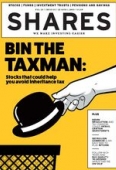Archived article
Please note that tax, investment, pension and ISA rules can change and the information and any views contained in this article may now be inaccurate.
Biden regulation and tax changes could derail certain investments

The latest signs that the Biden administration is getting tough on corporate regulation and tax have put the tobacco sector under pressure.
Shares in British American Tobacco (BATS) and Imperial Brands (IMB) fell between 5% and 6% on 20 April, mirroring similar moves for their US-listed counterparts, on reports the Biden team is considering plans to cap nicotine levels in cigarettes.
This could make tobacco companies’ core product less addictive and undermine sales. If these reports are correct, it’s another reason why the new president is turning out to be less than friendly to the business world, with tax increases clearly on the table.
There is talk of a global minimum tax rate, agreed by the world’s biggest economies. Biden’s administration might also force big companies to pay taxes where their revenues are earned, not where the profits can be shifted to.
Biden needs to pay for his stimulus and infrastructure spending plans, and it looks like this will encompass a big hike in the US corporation tax rate to 25% or even 28% from the current 21%. Such a change would hit businesses like Google and Facebook which have their international headquarters in Dublin to take advantage of Ireland’s 12.5% rate.
The Biden administration is looking at expanding the ‘global intangible low-tax income’ tax which was introduced under Donald Trump to make it harder to shelter intangible profit – i.e. that secured from intellectual property, copyrights and trademarks – overseas.
There are also proposals to levy a 15% minimum rate on book income to effectively ensure that all businesses pay something.
The key question is whether these changes are being factored into analysts’ earnings estimates and market valuations.
The impact of Trump’s corporation tax cut in late 2017 was significant, helping to drive big upgrades to earnings forecasts and provided a significant catalyst for the US stock market.
This only came through once the Trump tax cut had been introduced to Congress and signed into law, suggesting it may take some time for the negative impact of Biden’s tax increases to feed through to markets.
These new tax plans are still in their early stages and may be diluted as the administration looks to get them approved by US lawmakers. However, these issues are likely to garner increasing attention as we move through 2021.
Industries like healthcare and technology which derive a significant chunk of their profit overseas and pay limited tax on this profit look most vulnerable to any changes and this could reinforce the current rotation out of these sectors and into value stocks.
Important information:
These articles are provided by Shares magazine which is published by AJ Bell Media, a part of AJ Bell. Shares is not written by AJ Bell.
Shares is provided for your general information and use and is not a personal recommendation to invest. It is not intended to be relied upon by you in making or not making any investment decisions. The investments referred to in these articles will not be suitable for all investors. If in doubt please seek appropriate independent financial advice.
Investors acting on the information in these articles do so at their own risk and AJ Bell Media and its staff do not accept liability for losses suffered by investors as a result of their investment decisions.
Issue contents
Exchange-Traded Funds
Feature
Great Ideas
- It’s a great time to feast on McDonald’s shares
- Tracsis springs to life on summer shows optimism
- This engineering stock is racing higher after yet more earnings upgrades
- Virgin Wines’ shares are cheap for an online retailer and it is profitable
- The oil and gas stock shooting higher as new discovery confirmed
- Elementis is still a buy despite takeover disappointment
- The little known company that’s gone up by 88% since October

 magazine
magazine








